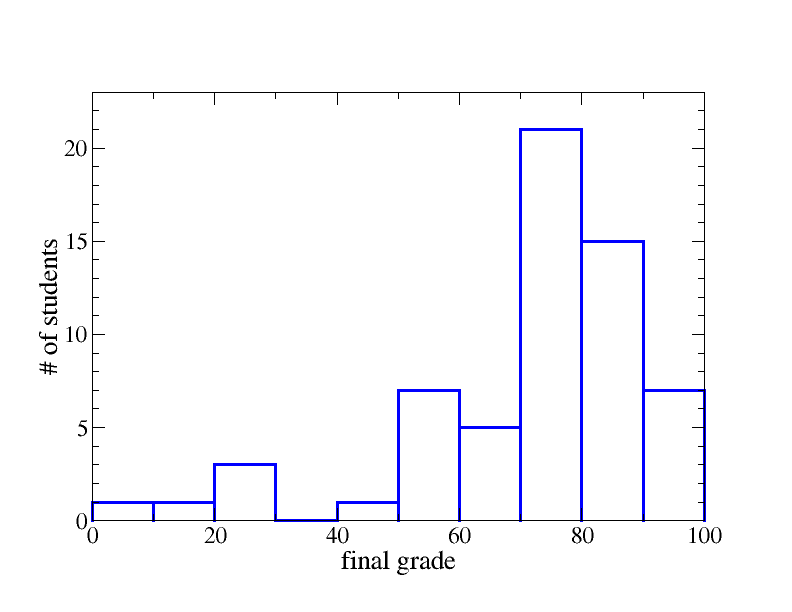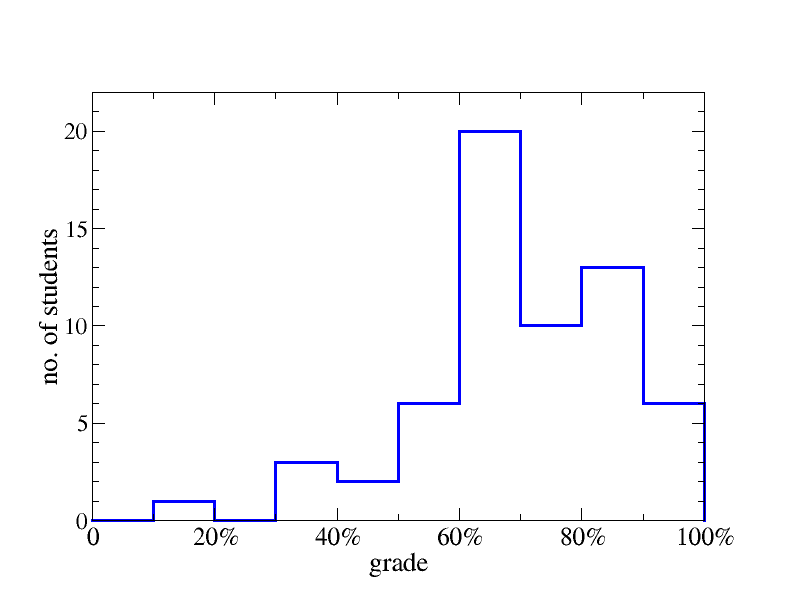 |
|
General |
PHYS206:
The grades have been submitted around 6pm on Thus, April 28. They should be listed and visible to you reasonably soon after. Here are some statistics. The average for the final exam grades is 71%. The exam was more challenging than last year's (in my opinion) yet you have done quite a bit better overall, so I am very pleased. Of course, some of you did more poorly than expected based on the amount of work and effort I know you put into this -- unfortunately that happens sometimes in life. While it hurts, you should still give yourself credit for the knowledge you accumulated, and try to feel positive about the end result: longterm, the knowledge is a lot more important than the grade.
The average for the final grades is 74% (this excludes the grades of those who did not write the final exam). A histogram is shown below. To all who passed, congratulations! To those who failed -- there will be a new instructor next year, hopefuly he will do better than I. Finally, best of luck in the future to all of you!

Here are the solutions for the final. As soon as the exams are graded and the grades officially approved, I will post statistics regarding the class average etc here. At that moment you should be able to access your grade to your account.
Here is the exam from last year, and here are the solutions.
Extra office hours (note that changes may occur at the last minute, based on emails I get from you and other meetings that suddenly show up in my schedule, so please check this every morning. If this schedule doesn't work with yours, email me asap and let me know what times/days work for you, so I can move things around).
The final exam is scheduled for Mon, April 18th at noon in IBLC182. Try to be there a few minutes early, so that we can start on time. It will be a 2.5h long exam with 5 problems to solve (one will be identical to a homework problem, they will all be worth equal grades). A cheat sheet containing up to five formulas is allowed, but you are expected to otherwise know all the relevant material (see below). Your name has to be written on your cheat sheet. A formula is any equation of the type A=B that we've used in class or the tutorials, eg the moment of inertia of a sphere to rotation about axis going through CM, I=2/5Mr^2. Combining multiple formulas in a single equation is not permitted. I will inspect the cheat sheets and change/confiscate those that do not follow these rules. It is likely that I will provide in the exam certain formulas which I think should be useful to you, but I will not tell you in advance which ones since that would essentially tell you what sort of problems you will get.
There will be extra office hours and problem solving sessions the week before the exam. I will post the times/locations here as they become available (this may only happen after I return to Vancouver, on April 11). If those times do not work with your schedule, email me and I will try to free more of my time for this. You will be able to pick hmw6 (and older hmws) any time during these office hours.
The material to be covered in the exam is shown on the "Lectures" page -- only topics with a * by their side will be tested. In preparation for the exam you should review homework problems (including those from last year), tutorial and textbook problems, as well as problems suggested on the files posted on the "Tutorial" page. I will post solutions for the tutorials 1-6 asap; again, chances are this will only happen once I'm back to Vancouver, the week before the exam.
Talking to or looking at a neighbor's work during an exam is not allowed, under any circumstances. All questions should be addressed to me. Attempts at academic misconduct will be severely penalized.
You must bring with you your student ID, or some other official form of identification that has a picture of you on it. No textbooks, notes or any other pieces of paper except the 5-formula sheet, programable calculators, etc are allowed in the exam room. Cell phones must be turned off and put away with your belongings (your cell should not be on your person, so that there is no possible way to receive/transmit information during the exam). All work should be done on the exam notebooks that will be provided to you. If you make a mistake, just cross out (with a big X) the offending paragraph. If you change your mind and decide that the crossed-out work was actually correct, make a note near it "this is correct" and continue with the solution. Don't waste time erasing and trying to make things look nice -- of course, I prefer to see nicely written exams, but the important thing is that they be correct, the "messiness" will not affect the grade (provided that the solution can still be deciphered).
Here are the midterm grades. Each problem was graded out of 10. For problem 1, the marking scheme is: (a) = 4 (3 for correct L, 1 for correct EL equations), (b)=3 (1 each for conservation laws, 1 for z=0 question), (c)= 2, (d)=1. For problem (2), the marking scheme was: (a)=8 (6 for correct L, 2 for EL equations) (d)=2. Your final grade is out of 20. I raised all grades by 0.5/20, so that the class average is just over 72%. A histogram of the grades is provided below. I will comment more on this, and on the procedure for appealing the grades, Fri. Febr. 11. If you cannot come this class but want to appeal your midterm grade, email me before the end of the reading break.

Here are the solutions for the midterm. I will return the midterms to you this Fri.
The midterm will be in class, on Mon, Febr. 7. Please try to arrive a bit early, so that we can start at precisely 1pm. The midterm will cover everything that was discussed in the first 9 lectures and first 4 tutorials (excluding mechanical similarity and other types of optimization problems). The midterm from last year is posted here. The solution to problem 2 is in hmw2. The solution to problem 1 is similar to homework problems from hmw3, so I will not post it -- but I will discuss it with you during office hours, if you have any questions about it.
There will be again 2 problems, but they could be quite different. Like last year, I may decide to give you some formulas, but this is not guaranteed. My main goal with this midterm is to check that you know how to derive the Lagrangian for a system and its EL equations, and how to find conserved quantities (if any). If you need extra practice problems, see the file posted on the Tutorials page.
I expect you to know all the needed formulas, so no cheatsheet is allowed. You do not need calculators or anything of that nature. There will be no make-up midterm. If you do not show up Mon, your midterm grade will be zero. The exception is for those who can provide a doctor's note or other signed paperwork giving a good justification for their absence. If this happens, you need to let me know asap that your absence was justfied, and bring the proof before the end of the week. If I accept the validity of your proof, we will discuss an alternative grading scheme.
